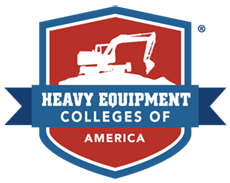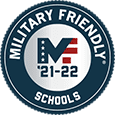Heavy equipment courses, like those offered on the seven campuses of the Heavy Equipment Colleges of America (HEC), prepare graduates to enter as operators running a number of types of heavy equipment in a wide range of work environments.
Here’s a look at some of the common things you can expect to learn at a heavy equipment school.
1. You’ll Learn to Operate a Variety of Types of Heavy Equipment
Depending on the specific program chosen, students will receive hands- on training on a number of different types of heavy equipment. Programs are designed to provide students with comprehensive knowledge and fundamental skills to prepare them to competently and safely operate one or more of the following common heavy equipment types:
- Backhoe/Backhoe Loader: A backhoe excavates earth using a backward-digging bucket. Backhoe loaders consist of a backhoe on one end and a front loader on the other, with a swiveling operator seat in between. Students learn about the different backhoe types and designs, proper setup, and digging and trenching techniques.
- Bulldozer: Often referred to simply as a “dozer”, a bulldozer features a powerful engine and dozer blade for the purpose of moving and grading of earth, sand, gravel, debris, etc. during construction. Tracks are used in place of wheels to allow for better ground contact and weight distribution.
- Excavator: similar to a backhoe but larger, an excavator is used on construction and industrial sites for a variety of purposes, including landscaping, digging trenches, preparing construction sites for foundations, lifting and placement, demolition, and more.
- Lattice Boom Crane: Lattice boom cranes features a steel lattice boom mounted on either a truck or crawler, and a series of guy wires used to raise and lower particularly large and heavy items.
- Mobile Crane: Mobile cranes feature a boom and cables with hooks to lift and place materials and equipment often into tight, and hard-to-reach places.
- Skid Steer: A form of loader with a small rigid frame featuring specialized attachments that allow it to be used for a variety of tasks, including earthmoving, snow removal, trench digging, materials transportation, and more.
- Wheel Loader: A wheel loader is a form of tractor commonly used on construction sites to perform multiple tasks, such as digging scooping, dumping and transporting of materials.
2. You’ll Learn About Heavy Equipment Inspection and Maintenance As Well
The operation of complicated piece of heavy equipment requires more than simply climbing aboard, starting it up, and completing the job at hand. Operators and their employers must be confident that their equipment is ready to do the job at any given time. And that requires effective inspection and proper maintenance on daily basis. Heavy equipment schools provide their students with the knowledge needed to identify potential equipment problems before they develop into time consuming, expensive, and possibly dangerous breakdowns.
3. You’ll Learn Basic Safety Skills of Heavy Equipment
Safety is of paramount concern on any construction site or anywhere else heavy equipment is found, and teaching safe work practices and procedures should be a fundamental goal of every heavy equipment school curriculum. Students should expect to be taught how to inspect and use safety equipment and protective gear, as well as Occupational
Safety and Health Admiration (OSHA) and National Institute for Occupational Safety and Health (NIOSH) inspection and reporting requirements.
4. You’ll Gain Knowledge on a Wide Range of Important Topics though In-Class Instruction
Hands-on training with real equipment is crucial, but today’s employers need their heavy equipment operators to possess a strong knowledge based on a variety of related topics. Heavy equipment schools understand this and offer the necessary classroom instruction to meet employer needs. Subjects commonly taught include:
- Construction Math: Mathematics plays a surprisingly important role in matters closely associated with heavy equipment and construction site operations and maintenance. Students will review basic math concepts, such as addition, subtraction, multiplication, division, and fractions. Construction math courses include instruction in unit of measurement and unit conversion, averages, percentages, ratios, conversions, as well as calculating areas and volumes.
- Rigging: An introduction to the principles and practices of basic rigging operations. Topics covered include load stress and safety. Instruction on rigging at this level is only to provide a basic understanding of rigging practices for heavy equipment operators and does not qualify students to perform rigging operations.
- Basic Blueprint Reading: Construction sites are second homes to heavy equipment operators. Therefore, it’s important for operators to have a clear understanding of what is being built on a particular site, and that requires a working understanding of blueprints. Students will learn basic blueprint terms, symbols, dimensions, scale, revision status, and more.
- Soils: An introduction to soil characteristics and composition. Topics covered include soil classification methods, soil compaction and density, and more.
- Grade Reading: Grading is a primary concern for heavy equipment operations on a construction site, so it’s important for operators to possess strong practical grading knowledge and skills. Topics include how to read construction plans to determine grading requirements, preparing graded surfaces with heavy equipment, identify and interpret construction stakes, methods for setting grades, and more.
- Hand Tools: Introduces the proper care and usage of hand tools commonly used in the maintenance of heavy equipment and on construction sites, as well as identification and purpose of specialty tools employed by various crafts.
5. You’ll Learn the Knowledge and Skills Necessary for Professional Certification
Most heavy equipment schools offer programs that not only teach how to safely and competently operate heavy equipment, but also qualify their student for professional certification. For example, successful completion of a program offered by a HEC school qualifies the graduate to sit for one of the following certification exams:
- Adaptable Equipment Proficiency Testing (ADEPT): Sponsored by the National Association of Heavy Equipment Training Services (NAHETS), ADEPT is a nationally-recognized certification for heavy equipment operators. HEC’s Heavy Equipment l and Heavy Equipment ll courses qualify students to sit for the ADEPT exam.
- National Commission for the Certification of Crain Operators (NCCCO): OSHA requires that crane operators on construction sites be certified by an accredited certification program. Both HEC’s Lattice Boom Crane and Mobile Crane Operation course qualify graduates to sit for the Crane Operator Certification Exam sponsored by the NCCCO, an OSHA-accredited certification program. HEC fully endorses the national certification program offered by the National Commission for the Certification of Crane Operators (NCCCO).
Professional certification of heavy equipment operators benefit employers by ensuring the competency of operators they hire, and also benefits employees since employers might prefer certified operators. It’s important, therefore, that potential students confirm that a program under consideration will qualify them to apply for processional certification.
6. You’ll Learn Heavy Equipment Training Quickly
The goal of heavy equipment school training is to teach its students the skills necessary to become qualified equipment operators and move directly from the classroom to the worksite. Most programs are geared to provide that training as quickly as possible without cutting corners. HEC’s heavy equipment and crane operator programs, for example, are all offered in an accelerated format that can be completed in as little as three weeks (six weeks for its Heavy Equipment ll program.)
National estimates will vary according to a number of factors, such as job location, specific employer, job description, and operator experience. Starting wages will be lower as national averages reflect workers with years of employment history and seniority. HEC does not guarantee outcomes and individual results, including wages and job opportunities will vary with each graduate.




